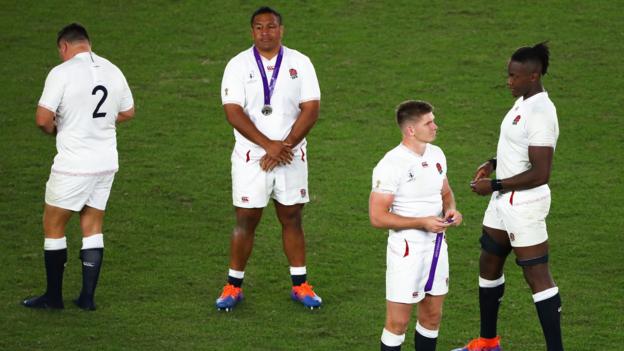
England head coach Eddie Jones fears some Saracens players could skip the Six Nations campaign to help their club avoid relegation after a 35-point deduction for salary cap breaches.
The deduction leaves the Premiership champions bottom of the table. They have also been fined £5.3m.
Sarries supplied six of the team who started for England in the 32-12 defeat to South Africa in the World Cup final.
"It could have a significant impact," Jones told BBC Sport.
"It's something we need to weigh up and look at very carefully."
Saracens have decided not to appeal against the punishments imposed upon them for infringements over the past three seasons so go from third place to bottom of the Premiership on -22 points, 26 behind second-bottom Leicester.
Jones selected six of their players for the final in Yokohama, led by captain Owen Farrell. The others were Mako and Billy Vunipola, hooker Jamie George, second-row Maro Itoje and full-back Elliott Daly, who is yet to play for the club after his summer move from Wasps.
"Obviously there may be some dislocation between Saracens players and the rest of the clubs," said Jones, who was Saracens' director of rugby in 2008/09. "That's a reality.
"So we may have to work to mend those relationships a bit harder, and there might be some Saracens players who feel like they've got to play for their club instead of their country, to make sure they don't go down. So we'll weigh all those up as they come about."
'I didn't realise how strong the class structure was'
Ensuring any issues between Saracens players and the rest of the squad do not do any damage is the latest challenge Jones must face as England coach.
Earlier he told BBC Radio 5 Live that the biggest hurdle he faced when he first took the job in January 2016 was getting to grips with the cultural differences within the group.
"I didn't realise the how strong the class structure was in England, and how that affects the relationships between the players," the Australian said.
"When you look at the England team from the outside it looks like a very homogeneous group but in fact it's very diverse and there probably hasn't been enough understanding of the diversity of the group.
"We spent a lot of time in our World Cup prep making sure we understood the value of diversity."
A report this year revealed that 37% of male British rugby union internationals came from fee-paying schools.
Jones, who hails from a working class suburb of Sydney, was asked whether the difference came down to the stereotypical rugby divide of "posh public schoolboys and state school kids".
"Something like that, yeah," he said.
"If you've got a group of people in here now and you've got five Japanese people, five Australians and five South Africans, they'll tend to congregate together and that's OK if they're not playing as a team.
"But if those 15 are playing as a team then you want that to be completely mixed, and they're the subtle things I was reasonably slow to pick up on."















 Phone: (800) 737. 6040
Phone: (800) 737. 6040 Fax: (800) 825 5558
Fax: (800) 825 5558 Website:
Website:  Email:
Email: 






